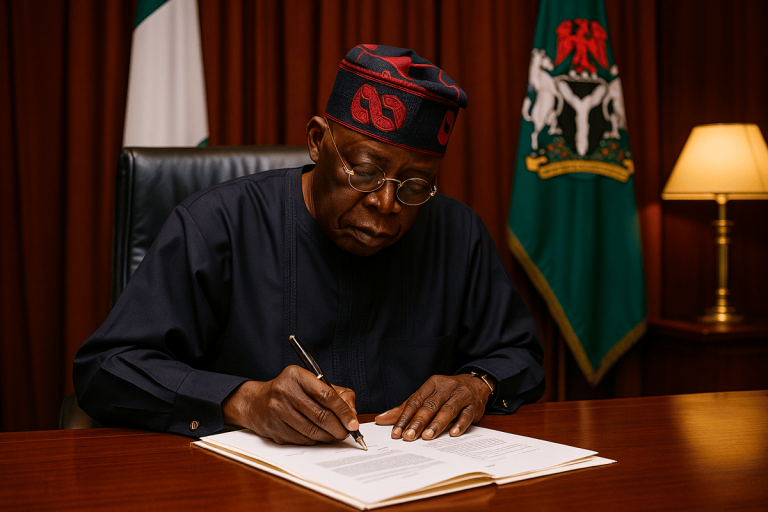
Content creator Peller disputes ₦36 million Lagos State tax demand, citing low TikTok income and fueling social media tax debate. Pic: Social Media
EPICSTORIAN — Habeeb “Peller” Hamzat, a 20-year-old TikTok content creator, has publicly criticised the Lagos State Government over a ₦36 million income tax demand.
In a recent livestream conversation with singer Tobechukwu “Peruzzi” Okoh, Peller revealed that the Lagos State Internal Revenue Service (LIRS) issued the tax notice, prompting debate over taxation of social media earnings in Nigeria.
The online creator, who won the “Best Content Creator” award at the Trace Awards & Festival in 2024, stated that he had not received any government assistance and questioned the legitimacy of the tax assessment.
“The task force said I should pay ₦36 million in tax. I swear to Almighty Allah, I don’t have anything. I only came into the limelight last year. Are you, Peruzzi, even paying tax, and how much is it? Why should I pay ₦36 million? What does that even mean? Why will the government take money from me when it has never given me anything, not even TikTok support?”
Peller explained that his earnings are primarily from social media platforms rather than Nigerian sources. He added that his earlier claim on TVC about earning money on TikTok was “all packaging” and did not reflect actual income.
Peller Lagos Tax Dispute Raises Questions on Social Media Earnings
The ₦36 million tax notice has highlighted the ongoing challenges of assessing social media earnings. According to the Lagos State Internal Revenue Service, all residents earning income, including digital revenue, are subject to taxation under the Lagos State Income Tax Law.
Experts note that while tax authorities increasingly monitor online creators, enforcement remains complex due to the international nature of social media platforms.
Nigerian creators earning through TikTok, Instagram, and YouTube may face assessments even if revenue originates abroad. A recent report on taxation in Nigeria emphasises that creators should maintain transparent records to comply with national tax laws.
Understanding Lagos State Income Tax for Nigerian Creators
Nigerian law requires that residents report income from all sources while residing in the country. The LIRS has intensified monitoring of high-profile individuals, including social media influencers, to ensure proper tax compliance.
Social Media Income Nigeria Under Tax Scrutiny
Authorities assert that compliance is mandatory. Non-payment of assessed taxes can lead to fines, asset seizure, or imprisonment. During the livestream, Peruzzi urged Peller to settle the bill promptly to avoid legal action:
“Why haven’t you paid your taxes? As a Nigerian, you know you must pay tax. The government doesn’t care whether you only came into the limelight last year. You must pay it; if you don’t, the government will arrest you.”
Industry analysts note that creators sometimes underestimate their tax obligations because online revenue can appear intangible or non-local. Nigerian law requires accurate reporting of earnings regardless of the source.
Nigerian TikTok Earnings and Regulatory Oversight
Guidelines from the Federal Inland Revenue Service indicate that all residents with income above the non-taxable threshold must submit tax returns, including foreign payments received from social media platforms. Tax authorities continue to stress that compliance is a legal responsibility.
Digital Revenue Taxation Challenges in Nigeria
Tax enforcement faces challenges, such as limited transparency from international platforms and inconsistent reporting. Nevertheless, the LIRS maintains that public figures, including social media creators, are subject to taxation and should maintain detailed records of their revenue streams to validate assessments.
Broader Implications for Social Media Content Creators
The Peller Lagos Tax Dispute underscores the evolving intersection of social media fame and fiscal responsibility in Nigeria. Increased visibility can trigger tax liabilities, particularly if authorities interpret online popularity as potential income. Financial advisors recommend that creators maintain separate personal and business accounts and document all revenue streams for compliance.
Compliance with Nigerian Digital Tax Laws
Experts suggest that creators track payments from platforms accurately, report earnings transparently, and engage professional advice when necessary. As digital revenues continue to grow, authorities may refine monitoring and introduce clearer frameworks for taxation of online income in Nigeria.
The content creator’s public dispute with the Lagos State tax authorities highlights the challenges facing Nigerian social media creators.
Also Read: Nigeria’s Vice President Shettima inaugurates Calabar ICT hub to boost MSME growth
While he claims minimal earnings, the LIRS asserts that compliance is mandatory. This case may set a precedent for the treatment of digital income and social media taxation in Nigeria.

